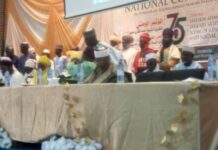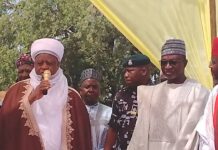By Maiwada Dammallam
To say yesterday’s (29/11/21) adjournment by the Supreme Court of the case of HRH. Al-Mustapha Jokolo to November 2023 is dizzying is to say the least.
To elect a date 2 clear years ahead by the Supreme Court to validate or invalidate previous decisions of two lower courts in the case of HRH. Al-Mustapha vs Kebbi State Government is the clearest proof of all that’s wrong with Nigeria’s justice system. And that’s for lack of better description.
This is a case that, for only God knows why, has been lingering in different courts for almost two decades — 2005/2021 — yet, still not showing any promising signs or receiving a final verdict.
This is a case that with each court sitting explicitly explain how diametrically opposed Nigerian courts are to the concept of justice and fairness.
In theory, Nigeria’s justice system was founded on the principles of justice and equity but in reality, it’s operated on the basis of the aphorism “might is right” or “survival of the fittest.”
Yesterday’s adjournment of this case to 2023 proves this sad truth beyond (to borrow the language of the lords) any reasonable doubt.
“Justice delayed is justice denied” is a legal maxim that if legal redress is available for a party that has suffered some injury, but is not forthcoming in a timely fashion, it is effectively the same as having no redress at all. It is unfair for the injured party to have to suffer the injury with fading hope for resolution and redress.
Nigeria is clearly trapped somewhere between the civilised concept of justice that ensures speedy trial for injured parties and the injurious uncivilized system of “might is right.”
This is about the only explanation which could put into proper perspective and help Nigerians make sense of the flagrant denial of justice HRH.
Jokolo is suffering in dignified silence while Nigeria’s noisy community of human rights crusaders seem either unaware or unconcerned.
One get the eerie feeling that human rights crusade(rs) are class and status sensitive hence, Jokolo, an elite and a royalty is not qualified for the attention and support of the community.
Otherwise, no human rights activist could fail to see the contradictions and inconsistencies that are the first, middle and the final albeit yet to be concluded chapters of Jokolo’s long search for justice.
For background, HRH. Jokolo, the 19th Emir of Gwandu, was deposed in 2005 under circumstances that were contradictory to the law. He promptly went to court to challenge his dethronement.
In 2014, the Kebbi State High Court 6, sitting in Birnin Kebbi, ordered his immediate reinstatement satisfied he was illegally deposed. In his ruling, the presiding judge, Justice Abbas Ahman said the deposition was contrary to law and that due process was not followed.
Not satisfied with the judgement, Kebbi State Government and Jokolo’s successor filed an appeal challenging the decision of the Kebbi State High Court.
In a unanimous judgement passed in April 2016, the three judges of the appellate court led by Justice Tunde Awotoye held that the 2005 deposition of the emir by the then Governor of the state, Senator Adamu Aliero contravened section 6 and 7 of the Chief Appointment and Deposition Law of the state because the governor neither made an inquiry into the allegation against the emir nor consulted the state’s council of chiefs before arriving at his decision.
The court held that from evidence place before it, the state government neither made inquiry into the allegation against Mr. Jokolo, nor consulted the state Council of Chiefs before carrying out the decision.
Still not satisfied with the decision of the Court of Appeal, Kebbi State Government and Jokolo’s successor approached the Supreme Court for a final decision.
One will expect the case will be speedily dispensed at the Supreme Court given that the job of the Supreme Court judges was made a lot easier by the two lower courts that took 14 years to sift through the details of the case and gave verdicts in favor of HRH. Jokolo. Unfortunately the hope of anybody expecting a speedy end HRH.
Jokolo’s prolonged search for justice continued to be shattered with unending illogical and inexplicable yearly adjournments that could be anything but a desire to implement or uphold the tenets of “justice delayed is justice denied” judicial maxim.
Just how long should it take the Supreme Court to review the verdicts of the two lower courts to affirm or deny that Kebbi State Government contravened section 6 and 7 of the Chief Appointment and Deposition Law of the state because the governor neither made an inquiry into the allegation against the emir nor consulted the state’s council of chiefs before arriving at his decision?
Truly, this case is dizzying as it defies any sense of logic. It’s overly contradictory to any sense of justice, fairness or even decency.
Given that previous adjournments were yearly and yesterday’s adjournment came with a 2-year tenure, one may as well expect the next adjournment might come with a full one term of 4-year prescription.
One doesn’t need more than a first lesson in elementary law school to know something is very wrong.
And the judiciary should be worried with the manner the case of HRH. Jokolo is being handled. This case is feeding fat on its integrity and making nonsense of it.
Only a fraction Nigerians are lawyers but that’s not saying the rest are not blessed with the basic intelligence to analyze judicial processes to identify when justice is done or denied.
HRH. Jokolo is being denied justice while being subjected to the inconveniences attached to the search for justice and something should be done by the NJC to put this case to rest either by giving him justice or by simply telling him he don’t deserve it.
There’s no better time than now for Nigerians to demand for a wholistic review of the judicial system justice to purge it of any impediment standing between Nigerians and fair system of justice.
HRH. Jokolo has done his part by respecting the system and having confidence in it. We should encourage the system to respect his patriotism, patience and resilience and reward him with speedy disposal of his case at the Supreme Court. He deserve to be liberated from the trauma of being enslaved to the courts.
The most important lesson of HRH. Jokolo’s long search for justice should not be missed by anybody. It’s a reflection of our travails as a nation.
Justice is an essential commodity which shouldn’t be beyond the reach or affordability of all citizens regardless of class or status. It’s the foundation on which civilized societies are founded.
Any society without a reliable system of justice is nothing more than a jungle.
Today it may be HRH Al-Mustapha Harun Jokolo, an Emir and a former ADC to a military Head of State.
Tomorrow it may be you, a present and probably future nobody who may have to rely entirely on a user-friendly system of justice to live life as it should be lived.




















